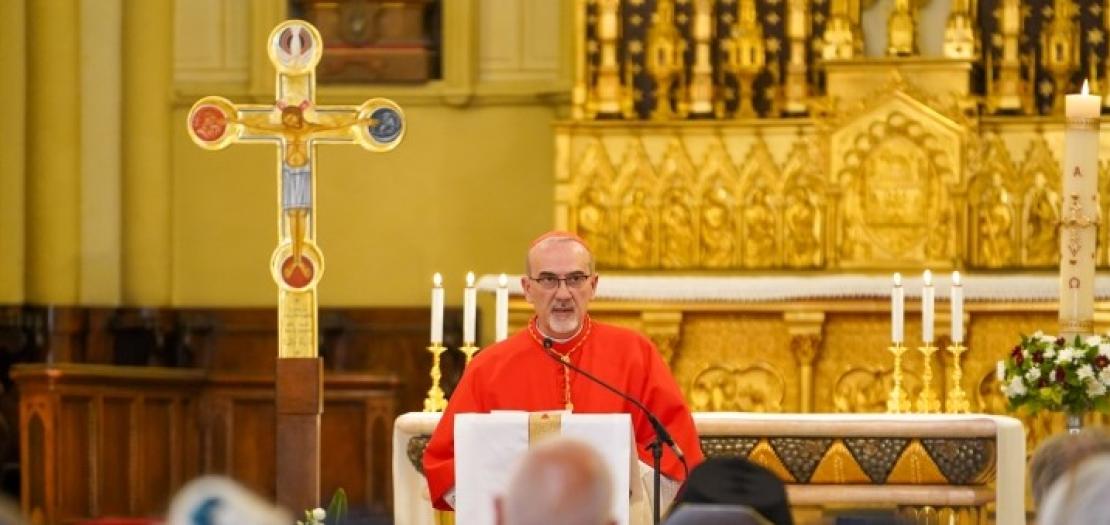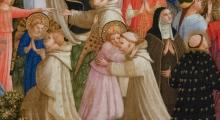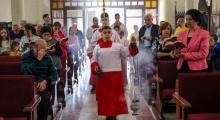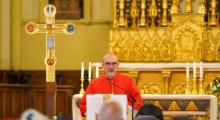Issued by the Catholic Center for Studies and Media - Jordan. Editor-in-chief Fr. Rif'at Bader - موقع أبونا abouna.org

Following is the text of the reflection on Nicaea 2025 by His Beatitude Cardinal Pierbattista Pizzaballa, Latin Patriarch of Jerusalem, dated May 20, 2025:
Dear brothers and sisters,
may the Lord give you peace!
Today, churches around the world are commemorating and celebrating the anniversary of perhaps the most important event in church history since the birth of the church itself. Nicaea, the council that brought together the bishops of the church at that time, an expression of the different souls and world views of the time, has shaped the Christian faith for all the generations that followed. Since then, everyone who believes in Christ, has spoken the same words in all churches and nourished his faith with the same expressions.
The person of Jesus has never ceased to fascinate the world. His coming into the world has changed history, raised questions, and also provoked rejection and resistance. At all times, in short, Jesus has in some way forced us to take a stand about him.
Accepting Jesus as the Son of God and God himself was indeed a groundbreaking innovation for the cultural world of the time. How could a man of flesh and blood like us belong to the Godhead? How could he be both the Son of God and God himself, from his own substance? How could a man die and rise again, be man and God? This was something completely unimaginable and at the same time something that fascinated believers all over the world. And from the beginning, various hypotheses and proposals about the identity of the Son of God followed and multiplied, all arising from the attempt to reconcile the disturbing figure of Jesus, the Son of God and God, with the small human mind. There were not even words to express this mystery. So even then there was no lack of heated arguments between the different souls of the Church.
1700 years ago, at Nicaea, in a religious, cultural and political context that was no less problematic than today, the Church had the courage and audacity to finally give the faith a form that was common to all, but at the same time clear, by also coining a new terminology capable of including in human words, as much as possible, the mystery of the Incarnation.
Since then, as I said, Nicaea has remained for each of us an indispensable point of reference for the life of our respective churches: from the understanding and definition of faith to the date of Easter and much more. Nicaea was, in short, the moment when the Church was able to interpret the need to say the faith, to express it according to the cultural categories of the time. As far as human language was capable, the Church was able to give expression to the mystery of the Word made flesh and dwelling among us, and to his constant presence in the Church.
Of course, history has shaped the life of our respective churches ever since. We have experienced divisions, even painful ones. We have all had to reckon with our small and large infidelities that have wounded the one body of Christ, the Church. Not infrequently, we have given ourselves over to our logic of power rather than to serving the mystical body of Christ.
But even in all our smallness, Nicaea has remained an indispensable reference for everyone to this day. Orthodox churches, Catholics, Anglicans, Protestants ... every Christian, regardless of which church they belong to, cannot avoid coming to terms with what the bishops of the Church of 1700 years ago were able to work out, certainly under the action of the Holy Spirit.
We live today in times that are not very different from those 1700 years ago. On the one hand, the political complexities and the logic of worldly power, which subjugate entire peoples, pose a great challenge to the life of the churches. But the cultural world and the various manifestations of what we now call “modernity” also challenge the life of all our respective churches: the idea of man, the concept of family, the need for community, the role of technology in personal and social life, the emerging economic and social structures, the migratory movements of entire peoples, the increasingly religiously and culturally plural societies... the list of manifestations that the modern world produces is numerous and even epochal.
And in this context, as the one Church of Christ, we are all called to give an answer to the questions that people are asking today, to respond to the needs, desires, and concerns of today's man.
Our answer is the same as it has always been and will never change. Christ is the answer. But just as 1700 years ago, we are called today to speak our faith in Christ boldly and courageously, intelligibly and clearly.
There is no question of rewriting the Nicene Creed. This text will still and forever be the reference for the life of all believers in Christ. Instead, it is a question of making these words and expressions credible and understandable for today’s cultural world. We will certainly have to continue to say that Christ is the only begotten Son of God, not made, of the same substance as the Father, whom the Spirit has given us. And that we can still encounter him today in the one, holy, universal and apostolic Church of Christ.
There is only one way to give concreteness and vitality, understanding and credibility to these expressions that are seemingly distant from the lives of people today: witness.
The Church today is called not only to pronounce the profession of faith, but to make it alive and credible through the witness of its members. When modern man encounters communities that are not perfect but in which life flows and in which he can find himself, when he sees Christians who are happy despite the difficulties of life, when he meets pastors who are ready to lay down their lives for their flock, when, in short, the Church still knows how to distinguish itself from the life and standards of the world, then the questions will arise: Why are you like this? Where do you get this strength from? Our answer will be that of the Church 1700 years ago. Then these words and expressions of Nicaea, which were apparently so obscure, will become luminous and will illuminate life of many in the world to come. That is my wish for us all.
Happy anniversary!







